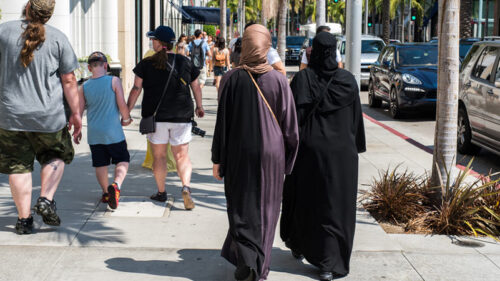A weaponized word can darken and even destroy those who fall within its umbra and penumbra. In fact, prior to bullets flying and bombs bursting, a side that devises a superior “word-weapon” can have a decisive advantage over its adversary, even if that adversary may bristle with weapons capable of frying humanity.
And nothing can better encapsulate the idea of a word as both a weapon and shield than the word “Islamophobia.” This is hardly surprising. In our age of ever-widening fissures, which show no signs of healing, there is perhaps no subject on which the world is as substantively and linguistically divided as it is over Islam and Muslims. In 1981, Elizabeth Hardwick, in her introduction to V.S. Naipaul’s book Among the Believers: An Islamic Journey, characterized Islam as “a challenge of notorious international intensity.” In 1993, we were informed of the impending Clash of Civilizations by Samuel P. Huntington. In 2005, after the 9/11 terror attacks, Huntington’s thesis was so keenly felt that the UN felt compelled to respond with a new initiative entitled “Alliance of Civilizations,” notwithstanding the many scholars who have labored to discredit or dismiss this thesis.
But matters have hardly improved. And in the dead center stands the word Islamophobia, the pithiest compression of the widest contestation.
On one side, there are persistent complaints of Muslims being “othered” as well as justifications for the UK All Party Parliamentary Group’s (APPG) definition of Islamophobia. In its defense, it is asserted that “Conceptualizing Islamophobia as a form of racism places it on the continuum of systemic injustices critiqued by anti-racist scholars, inviting more robust legal, social and cultural interventions. Aligning Islamophobia with broader anti-racist struggles strengthens collective efforts to expose, challenge and dismantle the structural conditions that sustain it as an enduring form of injustice in Western contexts.” There are many passionate and closely reasoned defenses of the term Islamophobia.
Opposed to the term are many brilliant, outspoken voices. These include the late Christopher Hitchens, a ferocious critic of the term “Islamophobia.” It is not easy to question the motivations of someone like Hitchens, for he was among the few who stood by Salman Rushdie during the furor that followed the publication of his novel The Satanic Verses. Writing on Twitter after the announcement of Hitchens’ death, Rushdie said: “Goodbye, my beloved friend. A great voice falls silent. A great heart stops.” In 2022, Rushdie narrowly escaped death but lost an eye as he was attacked by an Islamist in New York.
It is also more than a little ironic that Ayaan Hirsi Ali, an ex-Muslim (and now a Christian), should have been called a “decorated Islamophobe” with her work being witheringly attributed to ensuring “her own enduring prosperity by continuously broadcasting to the world the existential perils posed by radical Islam” and by “perpetuating hate.” Of course, even Naipaul — a winner of the Nobel prize for Literature — could not escape the “Islamophobe” label with Muslims questioning if he was given a Nobel for Islamophobia. Naguib Mahfouz, an Egyptian Muslim and another winner of the Nobel Prize for Literature, “was stabbed in the neck by a young assailant in 1994 while sitting in a car, waiting for a friend to drive him to his beloved Kasr al-Nil café in Cairo overlooking the Nile.”
In short, if there was ever a clash of civilizations, it is over the word “Islamophobia.” Is there a way forward out of this cul-de-sac?
We know what we need to do: talk about Islam and Muslims in a peaceful, rational and productive manner, while remaining true to the ideal that there is no subject beyond critical examination. Simply put: Can one talk about Islam and Muslims while avoiding the labeling of any and all criticism as “Islamophobic,” and also without descending into hate and violence?
Till now, the answer seems to have been a clear no. That’s because we literally lack the know-how to talk when it comes to Islam and Muslims. To remedy this situation, there follows a new 10-part series that elaborates on the methodology necessary to apply the newly coined word: ISLAMOFACTISM.
DAY 1: The Chance Encounter
BRUSSELS AT DUSK. In the Caffè Italiano, just a stone’s throw from Place du Luxembourg, near the European Parliament, sit two men nursing their drinks. Each has come alone. The first, in a grey suit, in his 50s, looks around as if seeking company. His gaze falls on the other. He’s 40ish, dressed casually, with a vaguely professional air. The 1st man makes eye contact with the 2nd, who nods. They strike up a conversation.
1st Man: Damn! The Brits observed November 2024 as Islamophobia Awareness Month. And now, they want to define Islamophobia formally. Ever since they left us, they have gotten some things right occasionally. Islamophobia is running wild in Europe! We in the European Union could do the same as the Brits. By the way, my name is European Union bureaucrat. Call me EU bureaucrat.
They shake hands.
2nd Man: Hi, my name is Islamofactist.
EU bureaucrat: An Islamofactist! What does that mean?
Islamofactist: I disagree with the word “Islamophobia,” as many others do. You might have read Islamophobia: An Anthology of Concerns. So many experts have criticized it, but the word Islamophobia seems to be more widely accepted than ever. To me, that won’t do, so I’ve coined a new word to discuss Islam and Muslims: ISLAMOFACTISM, and I’m an ISLAMOFACTIST.
EU bureaucrat: Well, with Islamophobia everywhere, you can’t be too careful discussing Islam. But tell me about your new word. How did you decide this would be the best approach?
Islamofactist: Easy. The EU inspired me as it says, “Fact-checking is a crucial pillar of the EU’s approach to disinformation. Fact-checkers help assess and verify content to provide the public with accurate, reliable information they can trust.”
EU bureaucrat: The EU is right. But why do you disagree with the word “Islamophobia”?
Islamofactist: The fact is that even the UN has officially stated that “Islamophobia is a contested term.”
EU bureaucrat: Really? When did it say so?
Islamofactist: In April 2021, the Special Rapporteur on freedom of religion or belief, Ahmed Shaheed — himself a Muslim and a former foreign minister of the Maldives — admitted to the UN Human Rights Council the term Islamophobia is “contested because charges of Islamophobia have been inappropriately and dangerously levelled at persons who challenge majoritarian interpretations of Islam, such as human rights activists, including women’s human rights advocates; members of minority Muslim communities within majority Muslim contexts; non Muslims, including atheists and other religious minorities; and dissidents in authoritarian States.”
EU bureaucrat: Sounds interesting. Did he say anything else?
Islamofactist: He also said that “criticism of the ideas, leaders, symbols or practices of Islam is not in of itself Islamophobia, and that international human rights law protects individuals, not religions.”
EU bureaucrat: OK, so you call yourself an Islamofactist. How does that work in practice? What can an Islamofactist discuss?
Islamofactist: One can use the Islamofactist method to discuss any aspect of Islam and Muslims. It discusses Islam and Muslims using facts, objective criteria and pattern identification. It’s badly needed because Europe seems to have lost its way of discussing them. There’s too much emotion. We need a clear-headed way forward that anybody can use.
EU bureaucrat: That’s problematic. You can’t treat Muslims as one group. With great diversity in the Islamic world, there isn’t one Islam.
Islamofactist: And that, Sir, is exactly the place for me to begin demonstrating the Islamofactist method. Are you ready to answer some questions and establish facts?
EU bureaucrat: I’ve got to run now, but what you say sounds super interesting. How about we meet tomorrow? Same place, same time?
Islamofactist: Done.
EU bureaucrat: (to the server) L’addition, s’il vous plaît.
They tussle over who will pay the bill and decide to split it. Outside, each goes their way, melting into the crowds.
[Cheyenne Torres edited this piece.]
The views expressed in this article are the author’s own and do not necessarily reflect Fair Observer’s editorial policy.
Support Fair Observer
We rely on your support for our independence, diversity and quality.
For more than 10 years, Fair Observer has been free, fair and independent. No billionaire owns us, no advertisers control us. We are a reader-supported nonprofit. Unlike many other publications, we keep our content free for readers regardless of where they live or whether they can afford to pay. We have no paywalls and no ads.
In the post-truth era of fake news, echo chambers and filter bubbles, we publish a plurality of perspectives from around the world. Anyone can publish with us, but everyone goes through a rigorous editorial process. So, you get fact-checked, well-reasoned content instead of noise.
We publish 3,000+ voices from 90+ countries. We also conduct education and training programs
on subjects ranging from digital media and journalism to writing and critical thinking. This
doesn’t come cheap. Servers, editors, trainers and web developers cost
money.
Please consider supporting us on a regular basis as a recurring donor or a
sustaining member.
Will you support FO’s journalism?
We rely on your support for our independence, diversity and quality.










Comment
Focusing on a word to define something much vaster is a perilous exercise, if not accompanied by a sense of irony. That’s why I would invite my readers never to take seriously the definitions I propose in my Devil’s Dictionary. Belief in sets of proposed facts is also a perilous commitment, akin to what religious fundamentalist do. As for Europe losing its way on every issue, proposing that as a fact seems to be me to be justified and worth discussing. However, expecting Europe or any other political entity to be a purveyor of facts or a guarantor of facts would be a betrayal of the very notion of truth, which is qualitatively different from facts, as most sages, from Plato to Wittgenstein and Lacan have insisted.